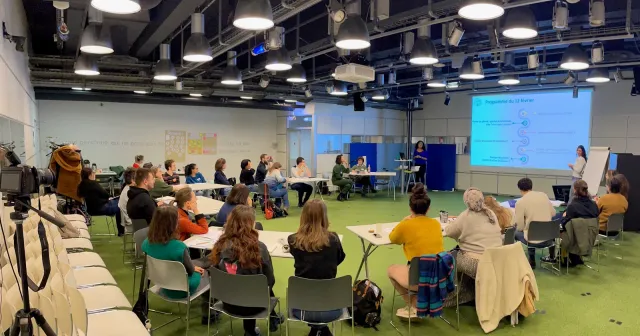EPALE interview: Régis Alvin on the digital exclusion of learners with intellectual disabilities

Régis Alvin is a project manager for the association Les Papillons Blancs de Lille, coordinator of the project Inclusive Digital Academy (IDA) and Day Centres Without Walls (DCWW). Régis is also part of the Executive Board of Caravan 2000 International, a network that has been working for 20 years for a greater inclusion of people with disabilities or disadvantages.
In an interview for EPALE, Régis tells us how his new project addresses digital exclusion of learners with intellectual disabilities, and the lessons learnt from the COVID-19 crisis.
Could you tell me a bit about les Papillons Blancs de Lille?
We’re a big organization based in Lille, France. We work with people with disabilities, both children and adults. Some of them live independently, others in our home residencies. To improve our work and share best practices, we are also part of European projects. We recently finished STELLA, an Erasmus+ project on basic skills for learners with disabilities, and one of our most important findings was that our learners still face a big digital divide. This is why we decided to apply for another project, IDA – Inclusive Digital Academy – and to focus on digital skills.
What are the main principles of the Inclusive Digital Academy?
It’s very important for us to work not for, but with people with disabilities. We work on their needs and we try to meet them with digital solutions. This means that we work together at every stage of the project: research, development of apps or of the e-learning content. One of our main aims in the project is to address the existing gaps. There is already a lot of content online that is addressed to people with physical disabilities, for example for those who are visually impaired or hard on hearing, but there is little available for people with intellectual disabilities. To get to know their needs, together with the partners we launched a survey, and we already got almost 300 replies, so we have a lot of material to build on.
One interesting conclusion from the results of the survey is that the digital vocabulary is also not so easy to understand, and you can’t give a reply if you don’t understand the question. The digital divide concerns a lot of aspects: the lack of knowledge, but also the lack of equipment, the lack of everything.

I can imagine that this digital divide was especially visible during the lockdown. How did you and your partners deal with the situation?
It wasn’t easy. Our learners and residents felt very vulnerable, they felt that they were losing every reference: of belonging to an organization, of belonging to a society. We did our best to help them. One of the main things we did was to provide correct information about the pandemic: about the use of masks and social distancing. It was very important for us to translate all the information from the health department into an easy to understand language or videos. Those partners who did not have the equipment to create or share online content, provided such information by sending it directly to the house of their learners.

To help our learners and residents stay in touch with their families, we organized one-to-one sessions to explain how to use Zoom. It sometimes took even two weeks until the person would be able to use it autonomously. We also found it very important to keep a daily structure, with tasks to do, which is key for physical and mental health. For example, our project partner from Sweden organized regular meetings in their facility, with gymnastics every morning and coffee every afternoon. At les Papillons Blancs de Lille, we continued therapy sessions via Zoom or Skype. We also organised challenges, for example to make something creative with noodles and other food items. We started a blog where different testimonials and photos were shared. One of our project partners asked their learners to do a little research on the Internet on a specific topic, complete a mission. One thing is sure: nobody was prepared for this, but we had to adapt quickly.
How do you see the future of adult education for people with disabilities? Are there any lessons learnt from the crisis?
I think that this crisis shows the need to stay connected with the world. If it happens again, we need to prepare our learners how to use digital tools. Our project will help us better understand their needs; we are now analyzing the results of the survey. On a positive side, we saw that those learners who didn’t refuse to use digital tools were actually enthusiastic, even passionate to learn.






About the situation in a residence for adults in Germany